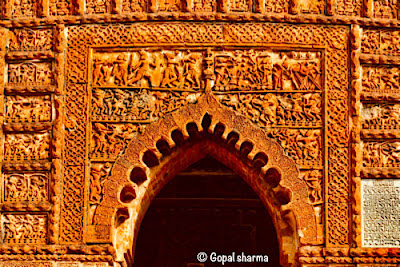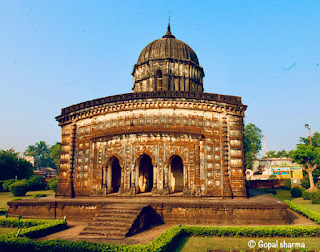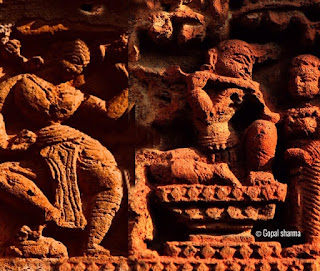bishnupur temples
Bishnupur is popularly known as the temple town of West Bengal. It is hundred and Thirty-eight kilometres from Kolkata and is located in the district of Bankura, West Bengal. In the earlier time stone always been in short supply in the vast flood plains of Bengal. Hence the architects had to restore to another alternative of stone As clay was easily available soon the burnt clay became a good substitute of stone. This gave rise to a new form of temple architecture which leads 'to the construction of elaborately decorated terracotta temples. Scattered Temples of Bishnupur, Bankura, West Bengal in Italian Terracotta literally means baked earth .west Bengal has the distinction of housing some of the finest terracotta art in the world. The terracotta art reached its pinnacle under the patronage of the Malla Kings of Bishnupur during the 17th century. The temples of Bishnupur, are now the pride of west Bengal and one of the most favoured tourist spot
The history of Bishnupur temples can be traced back to 694 AD when King Raghunath founded the Malla dynasty. However, it was in 994 AD that the place was named Bishnupur. The name is derived from the name of the Hindu God Vishnu. The most dominant king of the dynasty was King Raghunath Singh Dev II, who ruled from 1626 AD.
Bishnupur was the capital of the erstwhile Malla Kings who came from the north of India and they were inspired by the Vaishnava religion.
In the olden times, The area around Bishnupur and Bankura was called Mallabhum and the rulers or king was called Malla
The temple's architecture tells you how Bishnupur acted as a melting pot of various cultures and tradition you will often come across groups chanting kirtans, a religious music form
embedded in the age-old temple culture of Bengal
In 2007, Bishnupur became an official world heritage site by UNICEF.
Now the town has become a big tourist spot. So we are thankful to the Mallas for giving us Mallabhum(currently Bishnupur)

The Rasmancha Is a historical building
commissioned by Mallabhum king Hamir Malla dev (Bir Hambir)
in 1600 CE. The base of the temple is made of laterite stone and the upper part is made with bricks. its parallel has not been found elsewhere in India.
This monument is considered the pride of Bishnupur
The famed Madanmohan Temple
of Bishnupur was built by
the 53rd king of the Mallabhum,
Durjan Singha Dev (1682 CE to 1702 CE),
at Shankhari Bazar area of Bishnupur
in 1694 CE. It is the best
‘Ekratna’ (one tower) style temple of Bishnupur. The
architecture of
the temple with a square
flat-roofed building,
carved cornices surmounted
pinnacle and a single ‘sikhara’ (tower)
has enabled Madanmohan Temple to
earn the status of one of the finest
sculptures of Bishnupur
The inner and outer walls, along with the ceiling, are adorned with terracotta sculptures depicting Krishna Leela and episodes from great Indian epics like Ramayana and
Mahabharata.
SHYAMRAI
It is also known as Keshta Rai Temple, has a typical architecture that is usually found in the southern region of Bengal. The temple was built by Malla King Raghunath Singha in c.1655. The structure resembles two traditional 2-chala' village huts put together side by side. One of them serves as a shelter and the other serves as a shrine. The curved roof of these huts is surrounded by 4 chala-Shikhar The walls are decorated with terracotta panels describing scenes from Hindu epic the Ramayana and the Mahabharata along with floral and geometrical patterns. The details are so captivating it narrates the whole story visually.
Bishnupur
Bishnupur is popularly known as the temple town of West Bengal. It is hundred and Thirty-eight kilometres from Kolkata and is located in the district of Bankura, West Bengal. In the earlier time stone always been in short supply in the vast flood plains of Bengal. Hence the architects had to restore to another alternative of stone As clay was easily available soon the burnt clay became a good substitute of stone. This gave rise to a new form of temple architecture which leads 'to the construction of elaborately decorated terracotta temples. Scattered Temples of Bishnupur, Bankura, West Bengal in Italian Terracotta literally means baked earth .west Bengal has the distinction of housing some of the finest terracotta art in the world. The terracotta art reached its pinnacle under the patronage of the Malla Kings of Bishnupur during the 17th century. The temples of Bishnupur, are now the pride of west Bengal and one of the most favoured tourist spot
History
The history of Bishnupur temples can be traced back to 694 AD when King Raghunath founded the Malla dynasty. However, it was in 994 AD that the place was named Bishnupur. The name is derived from the name of the Hindu God Vishnu. The most dominant king of the dynasty was King Raghunath Singh Dev II, who ruled from 1626 AD.
Bishnupur was the capital of the erstwhile Malla Kings who came from the north of India and they were inspired by the Vaishnava religion.
In the olden times, The area around Bishnupur and Bankura was called Mallabhum and the rulers or king was called Malla
The temple's architecture tells you how Bishnupur acted as a melting pot of various cultures and tradition you will often come across groups chanting kirtans, a religious music form
embedded in the age-old temple culture of Bengal
In 2007, Bishnupur became an official world heritage site by UNICEF.
Now the town has become a big tourist spot. So we are thankful to the Mallas for giving us Mallabhum(currently Bishnupur)
 |
| TERRACOTTA GOD IIDOLS |
Art and craft of Bishnupur
Bishnupur is famous for its terracotta
temples and baluchari silk sarees
This vibrant town of terracotta magic is
not just about the temple and architectural splendour, there is a lot more like Baluchari
shells from shakhripara

Rasmancha
The Rasmancha Is a historical buildingcommissioned by Mallabhum king Hamir Malla dev (Bir Hambir)
in 1600 CE. The base of the temple is made of laterite stone and the upper part is made with bricks. its parallel has not been found elsewhere in India.
This monument is considered the pride of Bishnupur
 |
| Madanmohan temple |
Madanmohan Temple
The famed Madanmohan Temple |
| Madanmohan temple |
the 53rd king of the Mallabhum,
Durjan Singha Dev (1682 CE to 1702 CE),
at Shankhari Bazar area of Bishnupur
in 1694 CE. It is the best
‘Ekratna’ (one tower) style temple of Bishnupur. The
architecture of
the temple with a square
flat-roofed building,
carved cornices surmounted
pinnacle and a single ‘sikhara’ (tower)
has enabled Madanmohan Temple to
earn the status of one of the finest
sculptures of Bishnupur
Shyamrai Temple
Shyamrai temple was built by king Raghunatha Singh (1702-1712) of Mallabhum, in 1643, to honour Lord Vishnu in his form as Lord Krishna. |
| TERRACOTTA TILE ON WALL OF SHYAMRAI |
 |
| TERRACOTTA TILE ON WALL OF |
The inner and outer walls, along with the ceiling, are adorned with terracotta sculptures depicting Krishna Leela and episodes from great Indian epics like Ramayana and
Mahabharata.
SHYAMRAI
Jor Bangla Mandir
It is also known as Keshta Rai Temple, has a typical architecture that is usually found in the southern region of Bengal. The temple was built by Malla King Raghunath Singha in c.1655. The structure resembles two traditional 2-chala' village huts put together side by side. One of them serves as a shelter and the other serves as a shrine. The curved roof of these huts is surrounded by 4 chala-Shikhar The walls are decorated with terracotta panels describing scenes from Hindu epic the Ramayana and the Mahabharata along with floral and geometrical patterns. The details are so captivating it narrates the whole story visually.
Lalji Temple
 |
| LALJI TEMPLE |
Lalji Temple was built in 1658 CE
by Malla king Bir Singha II in
Eka-Ranta style. This temple has been devoted to Radha-Krishna. This temple bears similar architectural concepts like many of the earlier temples. It is built on a square elevated plinth, consisting of ornamental plaster decorations on low relief carvings are a typical feature of the temple.
 |
| STONE GATEWAY-PATHAR DARWAJA |
Pathar Darwaja
This fine arched gateway was built by dressed laterite stones This was built-in the second half of the seventeen-century byMallabhum king Bir Singha This gateway was the Northern entrance of the ancient
fort of Bishnupur







It is a good effort that we see the beauty, knowledge and grandeur of ancient india . And makes indian feel proud.
ReplyDelete